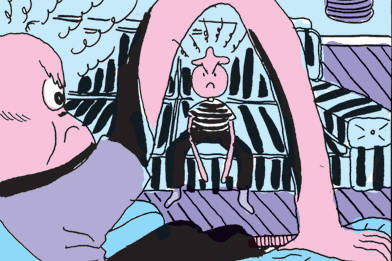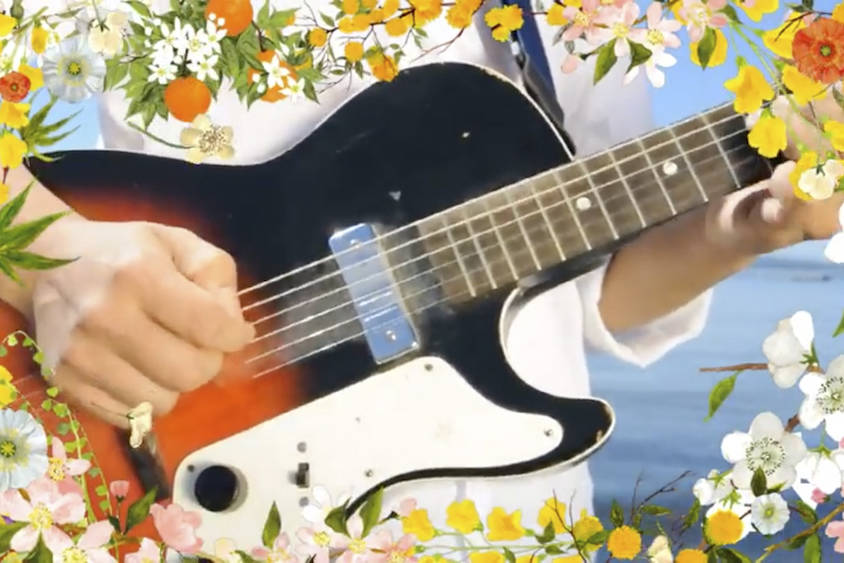On last month’s Third Daughter, the second LP from Seattle rapper DoNormaal, one track in particular foretold the August that would soon come. “I sense it all/I’m emotional,” she repeated, mantra-like, on standout song “Emotional,” a cathartic personal exorcism of all the myriad troubles (Seattle, family, friends, enemies, the Internet, egos) plaguing her. If you ever read through Space Witch, Elissa Ball’s excellent astrology column in the back of this newspaper, you’ll know that August was, indeed, so emotional. Leo season and eclipses will do that to a person. Unsurprisingly, some of the best local records we heard this August were double-stuffed with those intense emotions—love, melancholy, loss, darkness—but came out all the better for it.
Briana Marela
Call It Love
“Love Wins” has become the milquetoast rallying cry of the liberal #resistance. Trump proves how politically empty the slogan is every day, but in the world of music, love absolutely wins. A quick look at the Top 40 charts for 2017 shows Ed Sheeran warbling about how in love he is “with the shape of you,” Rihanna confessing “When I’m with you all I get is wild thoughts,” and Justin Bieber, pretending he knows Spanish, crooning “Quiero desnudarte a besos despacito” (“I want to undress you with kisses slowly”). The pop approach here usually falls into one of two categories: grand proclamations of all-consuming love or lusty come-ons. There’s a reason this kind of love song goes over so well: They present an idealized, two-dimensional image of what love means—two people for whom the whole world stops, who spend their every waking minute drinking top-shelf liquor together, boinking on exotic beaches, and staring into each other’s eyeballs. Love Wins.
Seattle-via-Olympia electro-pop artist Briana Marela offers a third way. Almost all her songs are love songs, but she approaches the subject from a borderline-scientific perspective; they’re less celebrations of the feeling than deep investigations of its dimensions, properties, and contours. On her last record, All Around Us, she defined love in terms of a wave: When two frequencies are in phase, they resonate and their amplitudes double, and that is “love.” When waves are out of phase, they diminish each other, and this, Marela believes, is an inevitability of love. “I don’t think you can be in phase with someone forever,” she told Seattle Weekly in 2015.
Marela’s new LP, Call It Love, puts love under an even higher-magnification microscope, and what results is her most dynamic record thus far. Its centerpiece, “Quit,” finds Marela at her most experimental, her production a sparse, lurching landscape of stuttering industrial percussion that at times harkens to the outré style of FKA Twigs. “Woke up one day and things were not the same/I went through the motions/Grasping at what had changed,” she mourns. “Now I have to sit and watch it fade/A year or more gone by I could have stayed.” As she accuses her fading love, “You quit calling my name, you quit,” she also suddenly offers a quavering way back in: “You could call me back?” On “Call It Love,” she calls into question its whole nature: “Was it worth creating?” she wonders aloud of a relationship. “If all we are is worth it, then I’m in whatever sickness love is/I’ve caught it.” That songs like “Give Me Your Love,” about the giddy feelings of initally falling for someone, can coexist next to others like these that define love as a kind of unwanted virus or an emotional prison makes for a refreshingly complex record on such a ubiquitous subject. In Marela’s world, love is not inevitably triumphant, nor is it something that should even happen sometimes, despite our feelings otherwise. Love doesn’t always win. But if you want it to, it takes more than empty platitudes. In Marela’s world, love is grand, but it’s also hard work, and once we admit that, we (along with our pop music and politics) become a little more human.
HimeHime
Bath Texts
Seattle’s Mackenzie Simon, aka HimeHime, opens his new album Bath Texts with the dusky, pitter-pattering “Contrails.” The rain-drenched tune is full of synthetic sighs, moody piano, and an organic, clattering back beat—an atmosphere created with the help of fellow local producer WMD. That the two would join forces makes complete sense. Both are young, talented artists forging a distinctly Northwestern path into the rapidly divergent world of contemporary electronic music. They each key in on the foggy, tree-lined ambience that has rocketed their more polished, bombastic tonal siblings, Odesza, to the top of the pop charts, but they do it without the antiseptic sheen that has made that group a yoga-studio favorite. Instead, they tend to prefer demure arrangements and chintzy, nostalgic 8-bit melodies. Simon in particular, however, clues in on an interesting Northwestern tension: Is the region still defined by the guitar? Some of the most interesting sounds coming out of Cascadia the past few years are hip-hop- and dance-oriented, so where does that leave the area’s indie roots? Simon answers that question by marrying everything together, a union that actually makes total sense in context. At its best, Bath Texts manages to evoke the whole spectrum of Northwestern life: its emotional, sparse guitar lines nodding to the region’s musical heritage, its glitchy electronics nodding to the region’s booming tech and video-game industry, and its delicately considered atmospherics nodding to the constant gray wonder of the area’s natural landscape. Songs like “Rigid” manage to capture that strange mix that defines life here so well—beautiful, sad, damp, all underpinned by a constant dull buzzing whose intentions or outcomes are unclear. Whatever strange recipe Simon’s landed on, Bath Texts feels true to the weird Seattle we inhabit right now.
Nearby
Garden Exercise
When you see Irene Barber onstage, she’s usually in the company of others. Whether in bands like XVIII Eyes or Dust Moth or decked out in monochromatic face paint alongside Erik Blood, her bewitching voice has given those groups a lot of gust in their gauzy sails. But what happens when it’s only her? Garden Exercise, the first EP from Barber’s new project Nearby, proves that even solo, she’s got the mojo. Unfiltered, she focuses the very tangible influence she’s brought into her various collaborative projects—a sweeping, dark romanticism, lush arrangements, and a knack for modernizing ’80s tonalities like New Wave, goth, and shoegaze—and trims away the rest. The five tracks that emerge are sophisticated and finely sculpted, a style Barber is calling “luxury bedroom.” The slow-motion grandeur of “Nearer Still” certainly evokes images of dark shadows, lace curtains, and velvet sheets. Barber does venture out of that bedroom, however, on the oceanic “Breakers,” an oscillating wave-like pulse propelling her forward as she proclaims that “I’ve been drowning the waves for you.” That being said, the ocean Barber’s created here is one worth submerging yourself in.
ksears@seattleweekly.com








